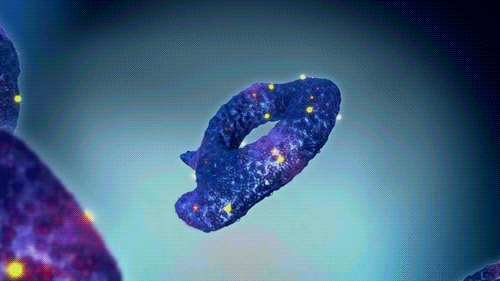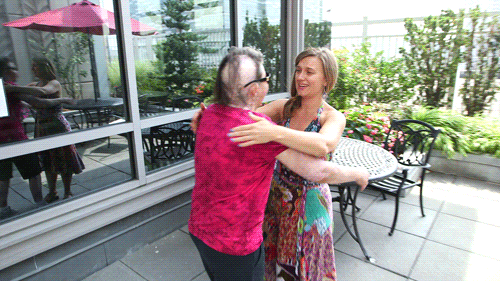Meet the woman who risked her life for a brand new face
"You will never meet a more resilient person than Carmen Tarleton," TechKnow contributor Lindsay Moran says of the inspirational face transplant recipient.
On this week's TechKnow, Moran travels to Vermont to meet Tarleton and learn more about the revolutionary technology allowed her a second chance at normalcy.
After a brutal attack by her now ex-husband, registered nurse Carmen Tarleton was left legally blind with burns over 80 percent of her body, what one doctor described as "the most horrific injury a human could suffer."
"Before I was attacked, I considered myself a good-looking person, an average-looking person," Tarleton says. After her attack, she endured 55 surgeries over the course of five years, but was still left with a face and neck that were disfigured and incredibly painful. A risky and rare procedure was her next best hope.
"I was stunned," Tarleton says, of finding out she was a candidate for a face transplant. "I was shocked that this could even be done."

After 14 months of waiting, doctors announced that they had found a potential donor for Tarleton. Cheryl Denelli-Righter, a 56-year-old woman who had suffered a sudden massive stroke and was on life-support in a coma. It wasn't a perfect match, but Tarleton didn't want to wait any longer. "I had waited a long time," she says, "and I said yes."
15 hours of surgery began with the procedure to remove Denelli-Righter's face, after her family consented to the donation. Carmen's team of surgeons had just four hours before her donor face would no longer be viable. In that time, they connected the blood vessels, nerves, and muscles to Carmen's face, then reconnected the bones to make the face and neck fit properly.
The risk associated with surgery was minimal compared to the life-threatening complications Tarleton was up against after receiving her new face. Because of the magnitude of her injury, Tarleton had received many skin grafts and blood transfusions from multiple donors. Doctors feared that her immune system would attack her new face, and they were right. After weeks of failed anti-rejection drugs, they were down to one last hope.

"We were literally on the last medication," explains Dr. Bohdan Pomahac, one of Tarleton's plastic surgeons. A full dose of the drug, a powerful anti-rejection medication called Alemtuzumab, could have completely shut down Tarleton's immune system. "The risk of death was significant."
But Carmen wasn't taking no for an answer.
"I told him that he needs to give me the drug," Tarleton recollects. "I wanted this face to work out. So I said, 'I'm going to do whatever I have to do.'"
The risk of trying was significant, but not as great as the risk of giving up. Rejection of the transplant would necessitate complete removal, leaving Tarleton back where she began.
"To my surprise, Carmen said, 'I would rather die than go back. I just don't want to go back,'" Pomahac remembers. "That's a powerful statement that I honestly didn't expect."
The doctors gave Tarleton a fractional dose of Alemtuzumab, small enough, they hoped, to alleviate the rejection without paralyzing her immune system. And it worked.
"It turned out that that was the last little bit that she needed," Pomahac says. The drug's effects helped Tarleton's body overcome the rejection and offered doctors important information to help current and future transplant patients who are suffering rejection.
As she gets comfortable in her new skin, Tarleton is constantly looking forward to her next achievement.
"My goal now is to have a face that works at least 90 percent normally within another year and a half," Tarleton says when asked about the future. "I can't show expression yet. I can move my lips and I can smile. It takes time to use her muscles that I no longer have."
Carmen is still on immunity medications and does daily facial exercises to continue gaining strength and control in her new facial muscles. She also took time to write a book "Overcome: Burned, Blinded, and Blessed" to help inspire others.
When asked about the positive message she wanted to convey in her book, Tarleton tells Moran, "I knew if people could see how far I've come, that they might take that chance to get past and overcome some of their demons so they wouldn't have to live in such a negative place."
Despite her struggles, Tarleton's life is full of people that keep her in a positive place. Her boyfriend, Sheldon Stein, met Carmen at a music store before her surgery and was immediately attracted to her strength. "Even the first day I saw how strong a person she was," he says. "Her inner beauty attracted me."
Tarleton's most meaningful relationship, however, may be with a woman didn't meet until after her surgery. Marinda Snow Righter knew that her mother, Cheryl, was an organ donor, but it wasn't until she had fallen into a coma after her stroke that Righter learned what doctors had in mind.
"It was brought to my attention that there was a possibility that she could be a match for a facial transplant," Righter tells Moran. "That kind of blew my mind a little bit."
Tarleton wanted to know who her potential donor was, but initially, all doctors could tell her about Denelli-Righter was her age.
"I was aware that it would be the family's choice whether or not to meet me," she says. In most face transplants, donors remain anonymous, but when Tarleton met Righter, the connection was instant and obvious to the crowd of reporters that filled their first press conference after Carmen's surgery.
"I looked at her through the glass and I could see her profile," Righter recalls of seeing Tarleton for the first time. "It very much looked like my mother's face... and then seeing her was just a wave of emotion."
"She came towards me," Tarleton remembers. "She had an aura about her that was just sweet and beautiful and loving."

Through Righter, Carmen has been able to learn much more about the woman who donated her face so that she might have a new one. When asked how she feels about being the family member who facilitated the donation, Righter is effusive, expressing her joy at the second chances for both Carmen and herself.
"The word I used the first time I met Carmen was 'elated,'" Righter tells Moran. "I felt elated. It's like this was all meant to be."
Righter is amazed by how much Carmen's new face recalls her mother and joyful at her own opportunity to continuing seeing her mother, though the connection the two women now share is far more than skin-deep. They will forever be bound by the physical and emotional memory of Cheryl Denelli-Righter that lives on through Carmen Tarleton.
"By the time I'd had surgery, it was Valentine's Day," Tarleton tells Moran. "To me, Valentine's Day is the day of love and it's the day of gifts. I felt strongly that it was a gift for me from her."
A gift of a new face--and a second chance.
Watch "TechKnow," Sundays at 7:30PM ET/4:30PM PT.
Error
Sorry, your comment was not saved due to a technical problem. Please try again later or using a different browser.